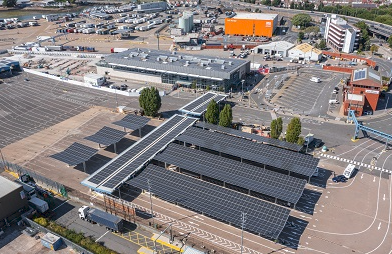PESO project successfully demonstrates how ports can cost effectively decarbonise activities and improve air quality

The Port Energy Systems Optimisation (PESO) project has demonstrated how ports can use smart grid technology and energy storage to decarbonise their activities, and reduce their adverse impact on air quality, more cost effectively than would otherwise be possible.
Portsmouth International Port, working with Swanbarton, ESC and MSE International, piloted the PESO smart energy system as part of a strategy to significantly decarbonise the port’s energy operations. The project, co-funded by Innovate UK, the UK’s innovation agency, has shown how port infrastructure can meet the UK Government’s ‘Clean Maritime Plan’ challenges cost effectively.
The PESO technical capability has been demonstrated in a pilot system comprising a novel dual chemistry battery and a multi-level control system. The control system includes an AI-based capability that learns from historic energy consumption profiles to ensure that the battery can deliver as much energy as possible when demand is high. The technology has been extended further by engineering a predictive ‘digital twin’ model that can ensure the battery has storage capacity to fully utilise energy generated by on-site renewable generation or procured from the grid at times of low price. This combined capability to minimise the cost of energy needed to supply vessels with energy and to drive the port’s own assets is a critical aspect of the PESO value proposition.
The project has shown that PESO technology can offer value to a wide range of ports. The prime ‘early adopter’ ports are likely to be in locations where vessels are obliged imminently to electrify in order to comply with policy developments in carbon emissions and air quality. Examples include passenger ferries and water taxis operating in cities where traditional fossil-fuelled combustion engines are not permitted. Terminals and recharging sites will be required and PESO has a critical role to play in minimising costly impacts on the local grid. It will do this by smoothing the power demand of the recharging sites and by prioritising as much power draw as possible at times of excess capacity in the grid (eg at night). The energy stored in PESO can then be made available to vessels when needed. A similar opportunity is presented by the growing take-up of all-electric leisure boats. These will need to access recharging facilities and it will be important for marina operators to ensure that popular recharging times (eg at weekends in summer) do not overload the grid connection capacity. PESO can help do this, and also minimise the cost of energy to the marina.
Ports have not traditionally been required to manage energy resources in this way. PESO has explored a range of business models that may offer practical ways forward for ports to take on this role. Whilst every port will need to make its own choice depending on its access to different energy resources, it seems likely that most ports will contract with a third party provider to build and operate the PESO system. A similar approach has already been adopted in other sectors such as EV fast-charger deployment. The value proposition for PESO can be strengthened significantly by exploiting the market for provision of balancing services to the grid and distribution networks. Infrastructure for storing and discharging significant amounts of energy to help balance the electricity network is increasingly in demand, and ports can become suppliers into this market. Again, third party operators would be best equipped to manage this kind of service delivery.
Although PESO has shown an exciting future for this technology in the ports and shipping sector, there remain barriers to overcome if this potential is to be fully realised. These include:
- The high cost of battery storage. Ongoing advances in alternative battery technologies, and economies of scale as the market for storage expands, will steadily reduce costs. PESO will be able to integrate with these alternative battery types as they become available;
- The need to collaborate more widely along the value chain for maritime logistics. In particular, developments in energy vectors and consumption on ships themselves will have an direct impact on the range of energy supply services imposed on ports;
- Policy developments on electricity pricing and public investment in the transmission and distribution networks will have a major impact on the PESO proposition to ports. Increasing clarity on such policy development is needed urgently.
The PESO consortium is actively working on a range of actions to advance the commercial deployment of PESO during 2023.
Jonathan Williams, CEO of Marine South East, noted, “The energy transition is imposing change along the complete maritime value chain and ports have a crucial role to play. We are delighted to help find the solutions that ports will depend on in the future.”
Mike Sellers, Port Director at Portsmouth International Port said: “Our aim is to turn the port into a living laboratory of green technology. We were delighted to collaborate with partners on the PESO project, which has so much potential for the wider ports and shipping industry. Combined with other sustainability initiatives, the findings from the PESO project will help us achieve our ambition of reaching net-carbon zero by 2030, and becoming one of the UK’s first zero emission ports by 2050.”
Image of Portsmouth International Port courtesy of Portsmouth International Port/Strong Island Media


